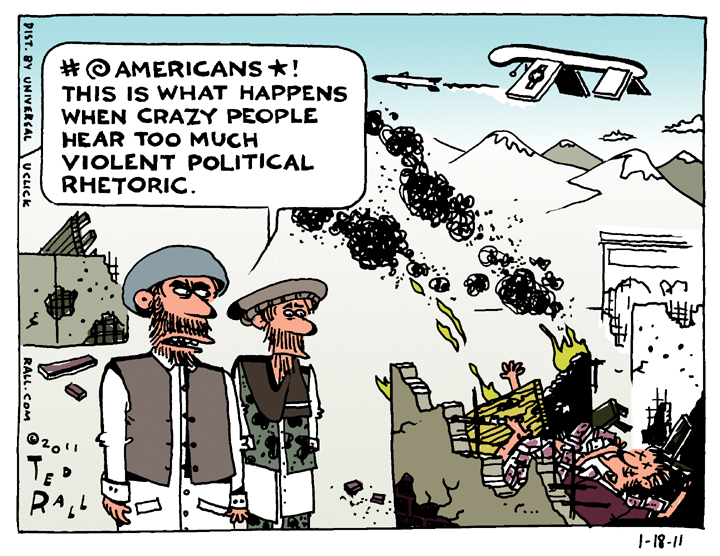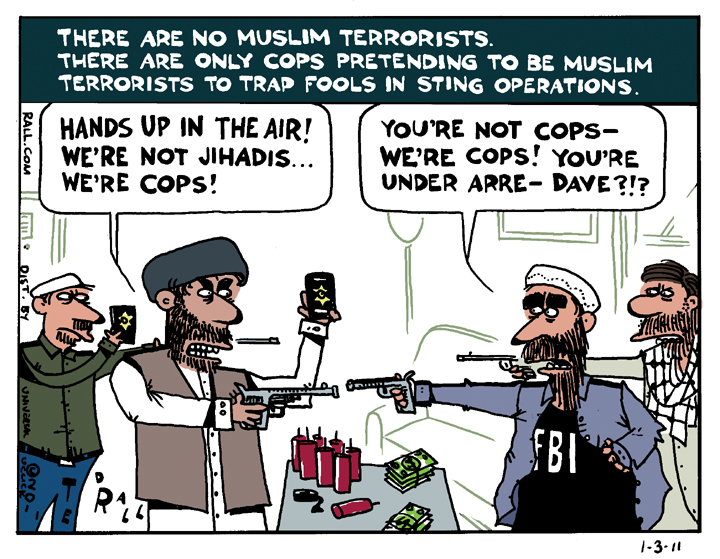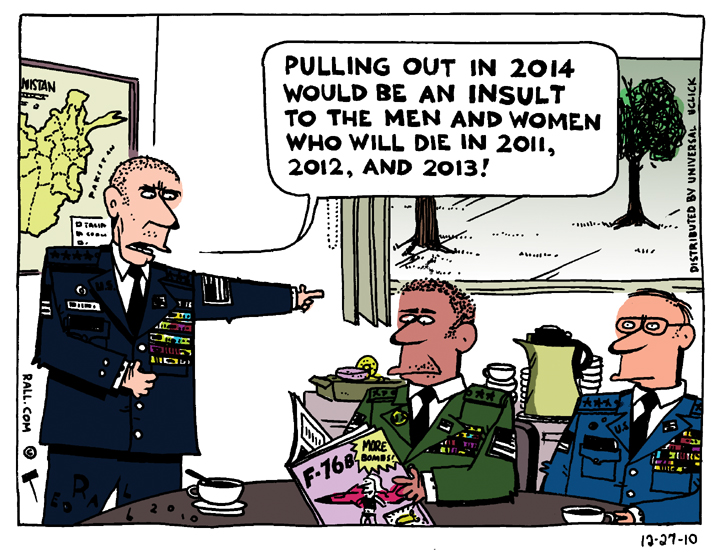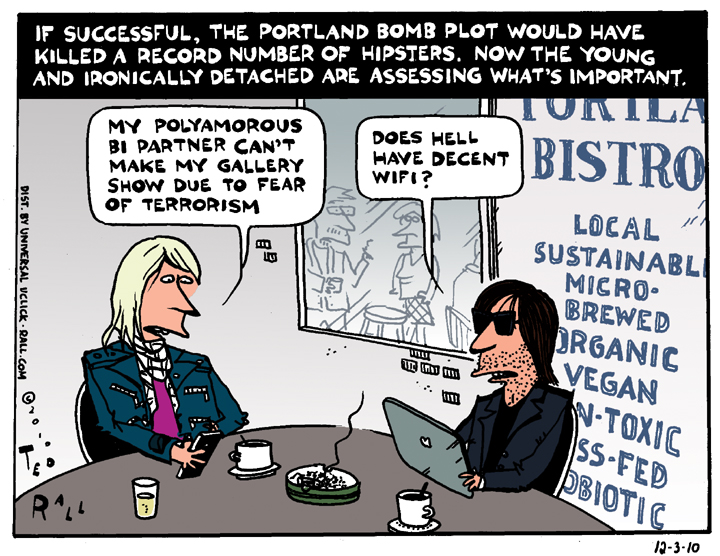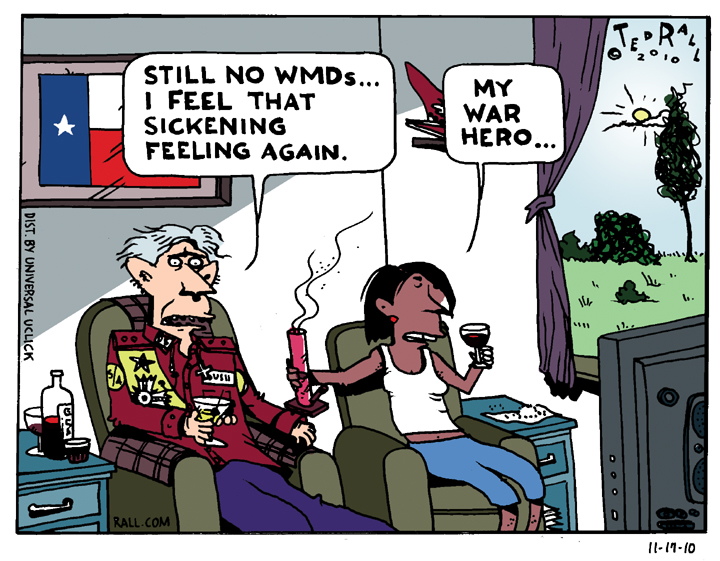After the shooting of a Tucson Congresswoman and a federal judge, political adversaries complain about one another’s violent political rhetoric. Perhaps the violence in our society reflects the violence of our politics.
SYNDICATED COLUMN: Political Violence? Stop Violent Politics
Media Spokesmen Move to Stifle Violent Speech
The shooting of Congresswoman Gabrielle Giffords and 11 other people is tragic. But it is not shocking. It isn’t even surprising.
What is surprising—weird, even—is the response of the corporate-owned political and media establishment. They’re coming out against violent rhetoric. Not real violence. They want to stop talk about violence.
Liberals accuse right-wingers of creating an atmosphere of hatred that fuels incidents like the Arizona shootings.
“We need to put the gun metaphors away and permanently,” urged MSNBC’s Keith Olberman. If he gets his way, a lot of people in Hollywood are going to be out of work.
Violent-rhetoric-causes actual-violence-is-a-liberal-meme. “Mission accomplished, Sarah Palin,” tweeted Markos Moulitsas of DailyKos after the Tucson shootings. Moulitsas noted that the website for Palin’s PAC featured an image of Rep. Giffords’ district with crosshairs over it. There is, however, no evidence that the accused gunman ever saw Palin’s website.
Righties counter that the really inflammatory rhetoric comes from the left. From, for example the likes of me: “Left-wing cartoonist Ted Rall’s most recent book calls for a violent response from the left against the right,” Erick Erickson of RedState whined after Giffords was shot. “The point of all of this is not to blame Ted Rall,” he then backtracked. Like hell.
The cognitive disconnect between reality and self-perception in American society and politics is bizarre and frightening. Whenever there’s a school or workplace shooting spree, Americans act shocked! shocked! shocked! To hear media commentators, you’d think this was a peace-loving nation of Dalai Lamas rather than a bunch of brawlin’, trash-talkin’, gun-totin’, foreigner-bombin’ yahoos who drive around Iraq shooting people while listening to death metal.
“Violence, or the threat of violence, has no place in our democracy,” said Keith Olberman. Does he live in America? Americans worship violence. Kicking ass is our national religion. “Violence and threats of violence” are part of our daily lives. As a kid, I got beaten up by bullies. As an adult, I collect death threats in response to my cartoons. When I ride my bike, motorists try to run me off the road. Most of my female friends have been raped.
When I served jury duty in New York prospective jurors were asked whether they or someone close to them had ever been the victim of a violent crime. Down the line they went, 50 at a time. They went through 150 people. Every New Yorker there had suffered the effects of a brutal assault or the murder of a loved one.
The first time I felt any self-respect was when I sent a high school bully to the hospital.
Sorry, Keith. Violence has plenty of place in our lame excuse for a democracy. Remember how Bush became president in 2000? He hired goons to assault Florida election workers and had a representative threaten a coup on national television.
“Such a senseless and terrible act of violence has no place in a free society,” chimed in President Obama. Who was either coming from or en route to a meeting with Pentagon generals to discuss America’s wars against Afghanistan and Iraq, or perhaps the occupation of Haiti, or expanding the new concentration camp at Bagram. How many assassination orders have you signed so far, Barry? How many extraordinary renditions? How many torture memos?
As I recently explained to an interviewer: “The reason I oppose this particular regime is because it is so aggressively violent.”
And I’m not talking about gun violence.
I’m talking about the wholesale over-the-top violence of neo-colonialism abroad, fueled by a cult of militarism here at home. U.S. forces are currently engaged in combat operations and propping up puppet regimes in Afghanistan, Iraq, Colombia, the Philippines, Pakistan, Somalia, Yemen and many other countries. They are hated and reviled there. Here every other car’s bumper urges us to “support our troops.”
We kill so many civilians we can’t be bothered to count them; not even America’s wimpy phony Left opposes the killing of “enemy” uniformed soldiers who die defending their homelands. Military action is America’s default response to every major news story. The 9/11 attacks? Kill them all—even if we’re not sure who “they” are. Hurricane Katrina? Send in the troops—not help. Indian Ocean tsunami, earthquakes in Pakistan or Haiti—anything and everything is an opportunity to invade, corrupt, pillage and murder.
The young man accused of shooting Rep. Giffords is portrayed as sick, deranged, and fond of oddball conspiracy theories. In these things, he is a typical American. “Typical” Americans, after all, believe in angels and creationism and that Bush found the WMDs in Iraq and trickle-down economics. Typical liberal Americans think it’s perfectly fine to give trillions to bankers while millions lose their jobs and get no help whatsoever.
The Tucson gunman is accused of an act of “senseless violence.” Here, too, he is just another face in the crowd. We all pay our taxes. None of us loses a minute of sleep as those taxes are used to make bombs and hire men and women to drop them on innocent people, who then blow into bits of flesh and bone.
Then there is the covert violence all around us: the tens of thousands of Americans who die annually because they can’t afford to pay for a doctor’s visit, the millions of children who go to bed hungry every night, the millions evicted from foreclosed homes (tell them it’s not an act of violence), the hundreds of thousands who sleep outside and the millions who couchsurf with friends and relatives because shelter is too expensive. We don’t even think about getting serious about solving these problems.
Like terrorism, political violence is a relatively minor issue. And as guys named Lincoln and Garfield and Charles Sumner—who was nearly beaten to death by a fellow member on the floor of the U.S. Senate in 1856—could attest, it is not a new one.
The brutality being carried out by the political system and its corporate sponsors is responsible for the equivalent of tens of thousands of Tucson-level shooting sprees each year in the U.S. alone. For example, a peer-reviewed scientific study published in 2005 found that the death toll directly attributable to income inequality is “comparable to the combined loss of life from lung cancer, diabetes, motor vehicle crashes, HIV infections, suicides and homicides.”
But the ruling classes doesn’t want us to think about reality. They want to make us shut up. Thus their calls to ramp down high-octane political speech.
Political violence? We should be much more worried about violent politics.
(Ted Rall is the author of “The Anti-American Manifesto.” His website is tedrall.com.)
COPYRIGHT 2011 TED RALL
SYNDICATED COLUMN: Next: Digital Totalitarianism
The Conspiracy to Abolish Cash
For many years figures on the political fringe, especially on the right, have claimed that the government and its corporate owners want to transform us into a cashless society. Their warnings about the conspiracy against paper money fell on deaf ears, primarily because the digitalization of financial transactions seemed more like the result of organic business trends than the manifestation of some sinister conspiracy.
Now, however, those who want to do away with liquid currency are stepping out of the shadows. They talk about increased efficiency and profit potential, but their real agenda is nothing less than enslavement of the human race.
“Physical currency is a bulky, germ-smeared, carbon-intensive, expensive medium of exchange. Let’s dump it,” argued David Wolman in Wired.
Citing a 2002 study for the Organization for Economic Development that states “money’s destiny is to become digital, ” a Defense Department-affiliated economics professor has authored an Op/Ed for The New York Times that asks: “Why not eliminate the use of physical cash worldwide?” Jonathan Lipow urges President Obama to “push for an international agreement to eliminate the largest-denomination bills” and urges the replacement of bills and coins by “smart cards with biometric security features.”
Lipow’s justification for calling for the most radical change to the fundamental nature of commerce since industrialization is, of all things, fighting terrorism. “In a cashless economy, insurgents’ and terrorists’ electronic payments would generate audit trails that could be screened by data mining software; every payment and transfer would yield a treasure trove of information about their agents, their locations and their intentions,” Lipow writes. “This would pose similar challenges for criminals.”
Terrorism is a mere fig leaf. According to the annual “Patterns of Global Terrorism” report compiled by the U.S. State Department, the highest total death toll attributed to terrorism in the last 20 years occurred in—surprise—2001. Including 9/11, only 3,547 people were killed in 346 acts of violence worldwide. Tragic. Obviously. But, in the overall scheme of things, terrorism is not a big deal.
Measured in terms of loss of life and economic disruption, terrorism is a trivial problem, hardly worth mentioning. According to the UN, 36 million people die annually from hunger and malnutrition. Over half a million die in car wrecks—but you don’t hear people like Lipow demanding that we get rid of cars. A more legitimate concern is the “loss” of taxes upon the underground economy, estimated by the IMF at 15 percent of transactions in developed nations.
What the anti-cash movement really wants is digital totalitarianism: a dystopian nightmare in which the entire human race is enslaved by international corporations and their pet governments. An anti-establishment gadfly like WikiLeaks founder Julian Assange could be instantly deprived of money—and thus freedom of movement—with a couple of keystrokes. (We saw a preview of this when PayPal and Amazon shut down WikiLeaks donation mechanism and web server, respectively.) The high-tech hell depicted by the film “Enemy of the State” would become reality.
It is true that, in a society where every good and service has to be paid for with a debit or credit card, terrorist groups would find it much harder to operate. Don’t forget, however, that today’s terrorists often become tomorrow’s liberators. Anti-British terrorists George Washington and Thomas Jefferson wouldn’t have stood a chance if the Brits had been able to intercept wire transfers from France.
Decashification would establish digital totalitarianism, a form of corporo-government control so rigid, thorough and all-encompassing that by comparison it would make Hitler and Stalin look like easygoing surfer dudes. The abolition of unregulated financial transactions would freeze the political configuration of the world, making it impossible for opposition movements—much less revolutionary ones—to challenge the status quo.
A society without dissent has no hope. Even if we lived in a perfect world where everyone was ruled by wildly popular, benevolent, scrupulously honest regimes—ha!—eliminating the slightest possibility of opposition would lead to barbarism.
We’re already more than halfway to a cashless society. In the U.S. few young adults still use checks. In many countries debit and credit card transactions now exceed those made via cash and checks combined. In 2007 the chairman of Visa Europe predicted the abolition of cash by 2012. Obviously he was wrong. But that’s where we’re headed. The U.K. plans to abolish checking accounts by 2018.
Even if you love your government, don’t want it to change, and think political opponents belong in prison, you ought to worry. As things currently stand, we know the big banks can’t be trusted. Remember when they introduced ATM cards? Banks wanted us to use them so they could lay off tellers. Then they instituted “convenience fees.” Which they have raised, and raised, to the point that taking $20 out of an out-of-town ATM could cost you $5 in fees ($2 for their bank, $3 for yours).
Imagine what your life will look like under digital totalitarianism. Your pay is direct-deposited into your bank account. You’ll pay for small purchases with your cellphone; if you owe a few bucks to a friend you’ll be able to bump your phone against your friend’s to settle up. Nowadays, some corporations allow you to control when your bills get deducted; in the future they’ll demand that you authorize them to do it automatically. What if you have a disputed charge? They’ll already have your dollars, or work credits, or whatever they’ll call them. Good luck trying to get it back from the Indian call-center guy.
As corporate ownership becomes increasingly monopolized and intertwined, your overdue phone bill might be owned by the same outfit as your bank, which would simply take what it says you owe.
The law of unintended consequences is getting a serious workout thanks to digitalization. Motorists in New York were thrilled when the EZPass system allowed them to breeze past lines at toll bridges—at a discount, no less. Then divorce lawyers began subpoenaing EZPass records to prove that a spouse was cheating. Next police set up EZPass scanners on the bridges; if you pass two of them too fast, a speeding ticket is automatically generated. The next step is to eliminate cash lanes entirely; non-EZPass tag holders will soon have their license plates scanned and receive a bill by mail—plus a $2 to $3 “handling” fee.
Think there are too many fees now? If you think you can’t trust banks now, imagine how badly they’ll gouge you when they control every single commercial transaction down to the purchase of a pack of gum. Angry about taxes? When tax agencies can take the money out of your account without asking, they will. Unlike cash, that phone bump to pay your friend will be a trackable, data mineable, fully taxable commercial transaction.
As if the post-2008 economic collapse hadn’t proven that no one is looking out for We the People but ourselves—and then barely so—the digivangelists tell us not to worry, that Big Brother, Inc. will smooth out the rough patches on the road to techno-fascist domination. From Wolman in Wired: “Opponents used to argue that killing cash would hurt low-income workers—for instance, by eliminating cash tips. But a modest increase in the minimum wage would offset that loss; government savings from not printing money could go toward lower taxes for employers.” Sure. The same way banks passed on the savings they earned by replacing tellers with ATMs to their customers.
Americans are skipping into the digital inferno wearing a smile and relishing the smell of their own burning flesh. Countless friends and acquaintances pay all their bills online. “I’m all about using my checking account in place of cash and would love to be able to eliminate cash entirely from my life,” gushed PCWorld’s Tony Bradley recently.
“Give me convenience or give me death” was the title of an album by the punk band Dead Kennedys.
We’ll get both.
(Ted Rall is the author of “The Anti-American Manifesto.” His website is tedrall.com.)
COPYRIGHT 2010 TED RALL
SYNDICATED COLUMN: Conning the Taliban
Confessions of a Phony American Peace Negotiator
For much of the year now drawing to a close, U.S. and NATO bigwigs conducted secret peace talks with Mullah Akhtar Muhammad Mansour, the #2 Taliban official. They paid him tens, possibly hundreds, of thousands of dollars to show good will. NATO planes delivered him to the presidential palace in Kabul, where he met with Hamid Karzai.
“But now, it turns out, Mr. Mansour was apparently not Mr. Mansour at all,” reports The New York Times. The phony Mansour, Afghan intelligence agents say, was actually “a shopkeeper from the Pakistani city of Quetta” who looked nothing like the real guy.
You can’t sugarcoat this debacle. L’affair Mansour instantly transformed the United States, previously reviled as the world’s most brutish bully, into an intergalactic laughingstock.
Yes, our government and military are headed by dumb-as-rocks hillbillies. But the Taliban can be fooled too—as I learned during my own top secret mission deep in the deepest valleys between the highest mountains of the Hindu Kush.
I found myself short of cash while traveling in Afghanistan in August. So I devised an ingenious scheme. Call it Operation Turnabout: Why not present myself to the Taliban as a high-ranking American official eager to end the war? It could be fun. It could be lucrative. And who knows? If they fell for it, I’d be up for the Nobel Peace Prize!
Finding Talibs didn’t take long. I walked up to two guys planting an IED. Or they were stoning some chick. I don’t remember. Anyway, it isn’t important.
“Salaam,” I greeted them. “I am American Vice President Joe Biden. Take me forthwith to your leader, Mullah Omar, he of one eye, and see that you are quick about it.”
The rogues chucked me into the back of their Toyota Landcruiser, wrapped in duct tape. Off we went. If I didn’t know better, I’d swear they hit every pothole on purpose.
Eventually, we stopped. They ripped the tape off my face. “American dog!” they cried in unison. “Time for dinner!” A kebab vendor glared at me from the side of the road. As did the goat head on the grill.
My animal cunning was too much for the two undereducated brutes. “Alas, my good fellows,” I replied, “my White House Amex card is not accepted by yon locals. Might I ‘borrow’ some money? You know—as good faith?”
Soon I was 17 afghanis richer. My plan was working!
A day or two later, my bound form was carried into an empty poured-concrete room in a complex somewhere in The Remote Tribal Areas Along the Border of Afghanistan and Pakistan, and dumped on the floor. A bearded man with an eye patch walked in.
“I am Mullah Mohammed Omar, Head of the Supreme Council and Commander of the Faithful of the Islamic Emirate of Afghanistan,” he said.
“Hi there,” I said. “I am American Vice President Joe Biden of America.”
He grimaced.
“How do I know you are who you say you are?” he asked.
“Ask me anything,” I challenged. “The combination to the safe where the Oval Office porn collection is kept. Vladimir Putin’s cell number. I can even identify most of the American states.”
He smiled.
“Of course you can,” he said. “But you could say anything. We have no way to check it out. The United States is a distant, remote country. Its leaders have never been seen in public, certainly not by Afghans. We don’t even know if there is a ‘Joe Biden.'”
“We must trust one another,” I purred, “if there is to be peace.”
I had him there. He chuckled. “Yes,” he said.
“Of course, travel between my country and yours is very expensive,” I pointed out. “As you may have heard, we Americans have spent all our money on bonuses for bank CEOs and hedge fund managers. So, if our quest for peace is to have a future, you must front me some cash.”
Sated with watery tea and partly-cooked goat parts, I headed for the Peshawar bus terminal. Where I reserved two full seats in coach. So I could ride, legs spread. American style.
Before long the media reported that the Taliban was conducting secret peace negotiations with “a high-ranking U.S. official.” Naturally, the Americans denied the leaks. President Obama spat: “The cunning enemy is trying to expand its military operations on the basis of its double-standard policy and wants to throw dust into the eyes of the people by spreading the rumors of negotiation.”
No one believed him. No one ever believes Americans.
Ha!
My brilliant ruse continued throughout the month. Sometimes the two cartoonists with whom I was traveling asked me where I was spending nights. “With Mullah Omar!” I wanted to shout. “Eating his nan and blowing through dozens of his afghanis!” But I couldn’t. “I was in the bathroom,” I lied.
Yes, we are a dumber-than-dumb people led by a stupider-than-stupid government. But the Taliban aren’t much smarter.
So there.
(Ted Rall is the author of “The Anti-American Manifesto.” His website is tedrall.com.)
COPYRIGHT 2010 TED RALL
Boycott the Body Scan
If you’re flying Thanksgiving week, support the national boycott on the radiation-based body scan machines at TSA checkpoints. Insist on a pat-down. It’s humiliating and intrusive, but at least there won’t be a nude image of you on sale somewhere next year. Also, it slows down the system–which could force the government to reconsider this awful decision.

